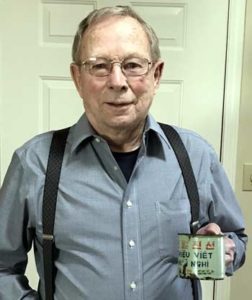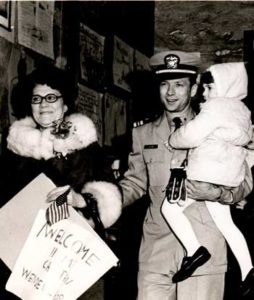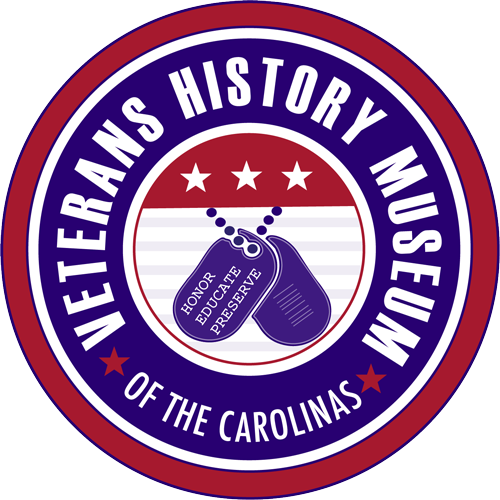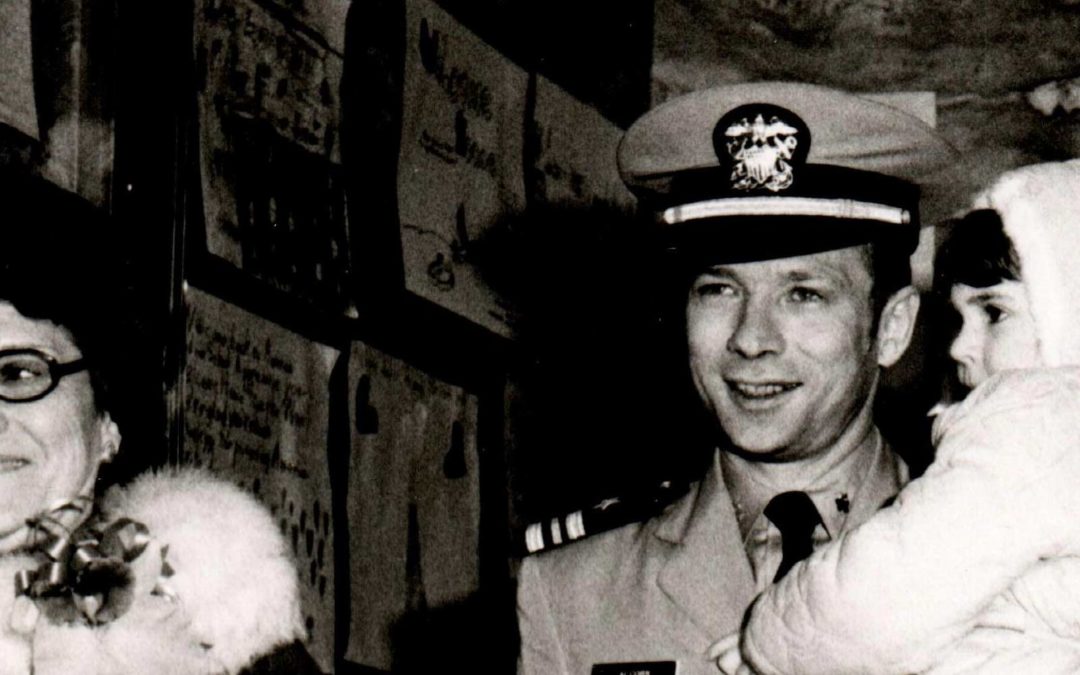Vietnam Veterans Series
By Michel Robertson
Ray Alcorn grew up on a farm in Pennsylvania. He served 30 years in the U.S. Navy including seven years as a prisoner of war. His last assignment before retirement as a Captain was as Dean of Students at the Naval War College. Alcorn and his wife, Karen, moved to Brevard full-time in 2006 and enjoy living near his sister and brother-in-law, Lou and Mike Shelley. Below, in his own words, is Ray Alcorn’s Vietnam story.
My brother and I were in a field baling hay one day while the National Guard practiced their maneuvers in F102s overhead. One pilot came down low and behind us and went over us at about 50’ then went rolling up into the air. I told my brother, “Someday I’m going to trade this tractor in for one of those.”
After college I went to Officer Candidate School for naval aviation and got my wings in June of 1963. In late 1965 our squadron was sent to Vietnam on the USS Enterprise, our country’s first nuclear powered aircraft carrier.
Shoot-Down
We started flying missions in Vietnam on December 2, 1965. On the 20th of December, on my 29th combat mission, I was shot down. On that day, we were to fly our first alpha strike — 90 airplanes going against a huge power plant complex outside the city of Hai Phong. The weather was terrible, about 400 foot overcast, 2-mile visibility and our Admiral sent word to Washington that we shouldn’t fly this mission. Washington said “Go hit it today. We don’t care what you have to do.”
We went in at 50 feet. We had flights of 4 in tight formation and we all dropped when the leader dropped. Ours was the 3rd flight through. Just as I was dropping my bombs, I was hit in the cockpit, a shell went through my oxygen mask, a shell hit me in the side of the neck and the oxygen mask blew up. I was temporarily blinded. At 500 miles per hour at 50 feet and unable to see, I had to make a quick decision. I’ll always live with the question of whether I made the right decision, because in a matter of seconds I could see again. But by that time I had ejected and was standing on the ground.
Up to my knees in the mud and water of a rice paddy, I went up over a dike and hid in a clump of trees in a ditch, covering myself with dirt and leaves. I could see 200 or so Vietnamese peasants coming across the field. They found me and pulled me out of the ditch. Two guys held my arms and others tried to get my flight gear off. Navy flight gear is all zippers, and they had no idea how to operate a zipper.
An old guy cut my torso harness and removed most of my clothes. They brought over a kid and handed him a rifle with a fixed bayonet on it. A guy with a camera took our picture. I saw it years later in a Vietnamese newspaper. A guard told me the caption said “12 Year Old Captures Yankee Air Pilot.”
No Geneva Convention
The people who captured me didn’t harm me. Eventually they turned me over to the regular army, and the whole ambience changed. The soldiers tied me up, tightly blindfolded me, and put me in a jeep. We stopped before dark at a little medical shack where a guy in a dirty white smock pronounced that I was alright. I had some serious burns on my face and my neck was bleeding quite a bit from the bullet wound. But he didn’t do anything for me. Three armed guards took me back outside. A mob of 50 or 100 descended on us, throwing stones, sticks and clubs. One of the things that helped me the most in the midst of this melee was a little old Vietnamese woman who reached out and put a small cake in my hand. Then she stepped back and made the sign of the cross.
By now it’s dark. They put me in the middle of a path with a bunch of kerosene lights. A man who spoke English with a thick French accent asked me, “What is your name, rank, service number and date of birth?” which are the only things you’re supposed to give should you become a prisoner of war. Then he said, “Your code of conduct doesn’t mean anything here. As far as we’re concerned, you’re among the blackest criminals in North Vietnam and that’s how you’re going to be treated.”
Then he started asking me other questions which I refused to answer. I’m sitting in this ring of lights and I can’t see anybody around me. People would step in and hit me with a rifle butt or fists. They beat me up pretty bad. Frenchie finally said, “If you’re not going to answer questions, we have no reason to keep you around.” They dragged me over to a ditch, had me kneel down, and put a gun to the back of my head. He said, “You have to the count of 10 to answer our questions.” He started counting. At 10 somebody behind me fired a gun. That ended the session for the first night.
Hanoi Hilton
I finally arrived at the “Hanoi Hilton” that night, a prison built by the French. Its real name was Hoa Lo, which means Hell’s Hole. They put me in a little section of cells and the next morning I heard a loud whisper. It was Commander Jim Stockdale, the senior Navy POW. He was in the cell across the hall.
Now Air Wing Commanders are normally around 40 years old. Here was a man who looked at least 75, totally grey beard, deep sunken eyes, black rings around his eyes, grey pallid skin. I said, “Holy smokes, how long have you been here?” This was the end of December. He said, “Since September.” And I thought, “Oh man.”
Stockdale instructed me to oppose everything they attempted to do to me, to the point of suffering permanent physical damage or until I began to lose my mental faculties. Then lie, cheat, steal, do whatever I had to do to minimize their gain. He gave me a code they used to communicate by tapping on the wall. Soon I learned that he was absolutely right. You weren’t going to be able to totally stand up to a hardline code of conduct position. They had means of extracting from you just about anything that they wanted. One guy told me, “You know, at one point, if they had brought my mother in and told me to shoot her, I probably would have.”
The Vietnamese were very skilled at their torture methods. About once a  month you’d be called in for an interrogation session where you would get the harangue of the day. When the harangue was finished, the interrogator would ask you for something — a statement opposing the war, a letter to your Congressman, a letter to the troops in South Vietnam, urging them to quit fighting. If you didn’t give it to them, you went back for another torture session until you did give them something, which we did. There was no choice.
month you’d be called in for an interrogation session where you would get the harangue of the day. When the harangue was finished, the interrogator would ask you for something — a statement opposing the war, a letter to your Congressman, a letter to the troops in South Vietnam, urging them to quit fighting. If you didn’t give it to them, you went back for another torture session until you did give them something, which we did. There was no choice.
I was in solitary confinement for six months. We ate twice a day. Each meal was a bowl of watery vegetables, maybe 2 or 3 little chunks of turnip or pumpkin, and either a plate of rice or a little loaf of French bread. I lost 50 pounds within the first 6 months I was there.
I had a little straw mat, one straw thick, which was my mattress on a concrete pad. Often the beds had a set of leg guards at one end where they would lock you down. We had guys that lived for up to 6 weeks locked in a set of leg irons with their hands tied behind their back. And so you lived. You had all of your bodily functions — which you lived in.
After several weeks, they took me to a hospital to remove the bullet from my neck. They laid me down on the operating table and turned on a big set of lights above it. I’d been cold with practically no sleep for weeks, so I immediately fell asleep on the warm table. They took the bullet out of my neck without anesthetic and I never knew it. They put salve on my burns. That’s all they did. I dripped blood and pus for six months, and they wouldn’t let me wash the whole time. They just let it fester.
Passing Time
My family didn’t know I was alive for the first 4 years. After my plane went down I was listed as MIA. Finally I was allowed to write a letter home. I received 13 letters while I was over there. All in those last 3 years.
As time went on, they kept putting more and more of us together. Once we got in the larger cells, we started getting more organized. Anybody that knew anything about anything taught it and we had classes. We would tell movies for entertainment. We decided they’d be made-for-TV-movies and those of us that didn’t know much about movies wrote the TV commercials. I taught agriculture and wrestling and we had wrestling matches. I also taught music so we had choirs and church services. And we put on some musical productions including Oklahoma. It was fun. Somebody could always come up with the next set of lyrics.
Coming Home
I lived in 11 different camps including one on the China border for several years. One night in the fall of 1972 we were moved back down to Hanoi where we learned about a B-52 bombing campaign in downtown Hanoi. They told us that we would be going home. They didn’t tell us when. Then one day they came in and opened the doors of all the cells of the Hanoi Hilton and said, “You go outside.”
We formed up in military formations with our senior guy in front and reported in as a military group would do. We were told that the war had ended and our release was part of the agreement. That was January 27, 1973 the day the Paris Peace Accords were signed. On February 12th, the first 200 prisoners were released. Before daylight, they put us on buses and took us to the Hanoi airport. We sat there until about 3 in the afternoon. Finally three C-141s flew in.
We lined up in 2 rows. They had painted a red line on the tarmac. You walked up to the line where a Vietnamese read your name. You stepped over the line and an American Air Force Colonel checked off your name. There was an escort officer for every prisoner who hustled us onto the plane. We were not convinced that they wouldn’t shoot us down. Finally we were airborne and the pilot came on and announced that we were “feet wet” (over the water); at that point the whole plane erupted.
We flew to Clark airbase to the Air Force hospital in the Philippines and they came up with some kind of stew. That was the first of our revolts. We said “NO, we want breakfast!” So they changed course. We were going through the food line and the cook asked the guy in front of me, “How many eggs would you like?” And Leroy said, “You can start with that dozen in your left hand.” Leroy ate 19 eggs that night.
After three days we were flown back to the states. I was returning to Bethesda Naval Hospital in Washington, DC so I flew into Andrews Air Force Base and a helicopter flew me around downtown DC. I was met by my family at Andrews. What a perfect way to come home.
Note: Ray Alcorn and 199 other POWs were released on February 12, 1973, forty-five years to the day of the publication of this article.
In collaboration with the WNC Military History Museum and writer Michel Robertson, The Transylvania Times will publish an article once every two weeks on a local veteran who served in Vietnam.
Article first appeared in The Transylvania Times on


Sadly Ray has passed a few days ago. I’m his cousin though we were great friends. I will and do sorely miss him. Roger Alcorn
Roger, we are sorry to hear of Ray’s passing and offer our deepest Condolences.
Ray Alcorn was my primary flight instructor at VT-25, NAS Beeville, TX. What a wonderful man and was instrumental in my successful 30 year Navy career. God Bless you Ray.
I was given the privilege of interviewing Mr. Ray Alcorn at the VA hospital when I was in school. His story has always inspired me and he has been to this day one of the kindest souls I have ever met.
Commander Ray Alcorn was my Commanding Officer at VT-25 in Beeville, TX. (1979); my first duty station after A School. It was an honor to serve under his command.
I was really moved by Mr. Alcorn’s story. Thank you for sharing it. It must have been an honor to have known him.